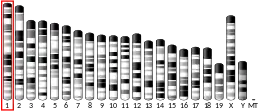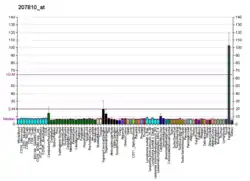F13B
Coagulation factor XIII B chain is a protein that in humans is encoded by the F13B gene.[5][6]
| F13B | |||||||||||||||||||||||||||||||||||||||||||||||||||
|---|---|---|---|---|---|---|---|---|---|---|---|---|---|---|---|---|---|---|---|---|---|---|---|---|---|---|---|---|---|---|---|---|---|---|---|---|---|---|---|---|---|---|---|---|---|---|---|---|---|---|---|
| Identifiers | |||||||||||||||||||||||||||||||||||||||||||||||||||
| Aliases | F13B, FXIIIB, coagulation factor XIII B chain | ||||||||||||||||||||||||||||||||||||||||||||||||||
| External IDs | OMIM: 134580 MGI: 88379 HomoloGene: 1512 GeneCards: F13B | ||||||||||||||||||||||||||||||||||||||||||||||||||
| |||||||||||||||||||||||||||||||||||||||||||||||||||
| |||||||||||||||||||||||||||||||||||||||||||||||||||
| |||||||||||||||||||||||||||||||||||||||||||||||||||
| |||||||||||||||||||||||||||||||||||||||||||||||||||
| Wikidata | |||||||||||||||||||||||||||||||||||||||||||||||||||
| |||||||||||||||||||||||||||||||||||||||||||||||||||
This gene encodes coagulation factor XIII B subunit. Coagulation factor XIII is the last zymogen to become activated in the blood coagulation cascade. Plasma factor XIII is a heterotetramer composed of 2 A subunits and 2 B subunits. The A subunits have catalytic function, and the B subunits do not have enzymatic activity and may serve as a plasma carrier molecules. Platelet factor XIII is composed of just 2 A subunits, which are identical to those of plasma origin. Upon activation by the cleavage of the activation peptide by thrombin and in the presence of calcium ion, the plasma factor XIII dissociates its B subunits and yields the same active enzyme, factor XIIIa, as platelet factor XIII. This enzyme acts as a transglutaminase to catalyze the formation of gamma-glutamyl-epsilon-lysine crosslinking between fibrin molecules, thus stabilizing the fibrin clot. Factor XIII deficiency is classified into two categories: type I deficiency, characterized by the lack of both the A and B subunits; and type II deficiency, characterized by the lack of the A subunit alone. These defects can result in a lifelong bleeding tendency, defective wound healing, and habitual abortion.[7]
Interactions
F13B has been shown to interact with Coagulation factor XIII, A1 polypeptide.[8][9]
References
- GRCh38: Ensembl release 89: ENSG00000143278 - Ensembl, May 2017
- GRCm38: Ensembl release 89: ENSMUSG00000026368 - Ensembl, May 2017
- "Human PubMed Reference:". National Center for Biotechnology Information, U.S. National Library of Medicine.
- "Mouse PubMed Reference:". National Center for Biotechnology Information, U.S. National Library of Medicine.
- Grundmann U, Nerlich C, Rein T, Zettlmeissl G (Jun 1990). "Complete cDNA sequence encoding the B subunit of human factor XIII". Nucleic Acids Res. 18 (9): 2817–8. doi:10.1093/nar/18.9.2817. PMC 330776. PMID 2339067.
- Bottenus RE, Ichinose A, Davie EW (Feb 1991). "Nucleotide sequence of the gene for the b subunit of human factor XIII". Biochemistry. 29 (51): 11195–209. doi:10.1021/bi00503a007. PMID 2271707.
- "Entrez Gene: F13B coagulation factor XIII, B polypeptide".
- Carrell, N A; Erickson H P; McDonagh J (Jan 1989). "Electron microscopy and hydrodynamic properties of factor XIII subunits". J. Biol. Chem. UNITED STATES. 264 (1): 551–6. doi:10.1016/S0021-9258(17)31294-2. ISSN 0021-9258. PMID 2491853.
- Achyuthan, K E; Rowland T C; Birckbichler P J; Lee K N; Bishop P D; Achyuthan A M (Sep 1996). "Hierarchies in the binding of human factor XIII, factor XIIIa, and endothelial cell transglutaminase to human plasma fibrinogen, fibrin, and fibronectin". Mol. Cell. Biochem. NETHERLANDS. 162 (1): 43–9. doi:10.1007/bf00250994. ISSN 0300-8177. PMID 8905624. S2CID 23583301.
Further reading
- Muszbek L, Adány R, Mikkola H (1997). "Novel aspects of blood coagulation factor XIII. I. Structure, distribution, activation, and function". Critical Reviews in Clinical Laboratory Sciences. 33 (5): 357–421. doi:10.3109/10408369609084691. PMID 8922891.
- Murdock PJ, Owens DL, Chitolie A, et al. (1992). "Development and evaluation of ELISAs for factor XIIIA and XIIIB subunits in plasma". Thromb. Res. 67 (1): 73–9. doi:10.1016/0049-3848(92)90259-D. PMID 1359667.
- Nishimura DY, Leysens NJ, Murray JC (1992). "A dinucleotide repeat for the D1S53 locus". Nucleic Acids Res. 20 (5): 1167. doi:10.1093/nar/20.5.1167. PMC 312140. PMID 1549502.
- Saito M, Asakura H, Yoshida T, et al. (1990). "A familial factor XIII subunit B deficiency". Br. J. Haematol. 74 (3): 290–4. doi:10.1111/j.1365-2141.1990.tb02585.x. PMID 2334637.
- Greenberg CS, Dobson JV, Miraglia CC (1985). "Regulation of plasma factor XIII binding to fibrin in vitro". Blood. 66 (5): 1028–34. doi:10.1182/blood.V66.5.1028.1028. PMID 2413926.
- Carrell NA, Erickson HP, McDonagh J (1989). "Electron microscopy and hydrodynamic properties of factor XIII subunits". J. Biol. Chem. 264 (1): 551–6. doi:10.1016/S0021-9258(17)31294-2. PMID 2491853.
- Webb GC, Coggan M, Ichinose A, Board PG (1989). "Localization of the coagulation factor XIII B subunit gene (F13B) to chromosome bands 1q31-32.1 and restriction fragment length polymorphism at the locus". Hum. Genet. 81 (2): 157–60. doi:10.1007/BF00293893. PMID 2563250. S2CID 10282464.
- Grundmann U, Amann E, Zettlmeissl G, Küpper HA (1986). "Characterization of cDNA coding for human factor XIIIa". Proc. Natl. Acad. Sci. U.S.A. 83 (21): 8024–8. Bibcode:1986PNAS...83.8024G. doi:10.1073/pnas.83.21.8024. PMC 386859. PMID 2877457.
- Ichinose A, McMullen BA, Fujikawa K, Davie EW (1986). "Amino acid sequence of the b subunit of human factor XIII, a protein composed of ten repetitive segments". Biochemistry. 25 (16): 4633–8. doi:10.1021/bi00364a027. PMID 3021194.
- Bender K, Bissbort S, Klein A, et al. (1987). "Coagulation factor XIII: genetic linkage studies with F13B". Genet. Epidemiol. 4 (1): 43–9. doi:10.1002/gepi.1370040106. PMID 3471677. S2CID 46436854.
- Kaczmarek E, Liu Y, Berse B, et al. (1995). "Biosynthesis of plasma factor XIII: evidence for transcription and translation in hepatoma cells". Biochim. Biophys. Acta. 1247 (1): 127–34. doi:10.1016/0167-4838(94)00167-f. PMID 7873582.
- Hashiguchi T, Saito M, Morishita E, et al. (1993). "Two genetic defects in a patient with complete deficiency of the b-subunit for coagulation factor XIII". Blood. 82 (1): 145–50. doi:10.1182/blood.V82.1.145.bloodjournal821145. PMID 8324218.
- Radek JT, Jeong JM, Wilson J, Lorand L (1993). "Association of the A subunits of recombinant placental factor XIII with the native carrier B subunits from human plasma". Biochemistry. 32 (14): 3527–34. doi:10.1021/bi00065a002. PMID 8466897.
- Siebenlist KR, Meh DA, Mosesson MW (1996). "Plasma factor XIII binds specifically to fibrinogen molecules containing gamma chains". Biochemistry. 35 (32): 10448–53. doi:10.1021/bi9606206. PMID 8756701.
- Kaetsu H, Hashiguchi T, Foster D, Ichinose A (1997). "Expression and release of the a and b subunits for human coagulation factor XIII in baby hamster kidney (BHK) cells". J. Biochem. 119 (5): 961–9. doi:10.1093/oxfordjournals.jbchem.a021336. PMID 8797098.
- Sugimura D, Fukue H, Arai M, et al. (1996). "[Changes of factor XIII a and b subunit in patients with disseminated intravascular coagulation syndrome]". Rinsho Byori. 44 (4): 355–61. PMID 8847818.
- Achyuthan KE, Rowland TC, Birckbichler PJ, et al. (1997). "Hierarchies in the binding of human factor XIII, factor XIIIa, and endothelial cell transglutaminase to human plasma fibrinogen, fibrin, and fibronectin". Mol. Cell. Biochem. 162 (1): 43–9. doi:10.1007/bf00250994. PMID 8905624. S2CID 23583301.




